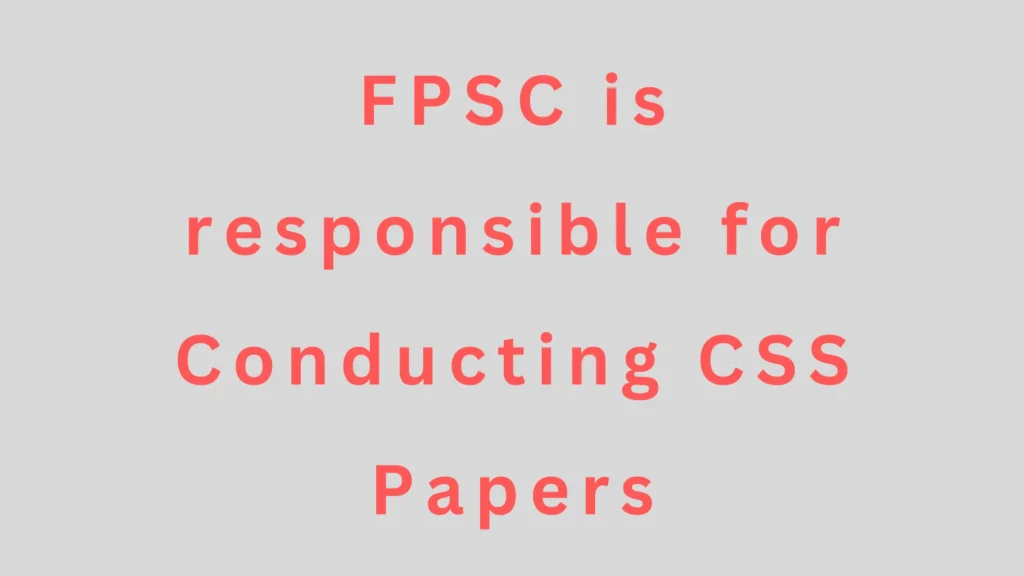Introduction
The Federal Public Service Commission (FPSC) exam is a gateway to some of the most prestigious and sought-after government jobs in Pakistan. Aspiring candidates often find themselves navigating through a maze of information and requirements. This guide aims to provide a comprehensive roadmap to help you successfully prepare for and ace the FPSC exam.
Understanding the FPSC Exam Structure
Types of Exams Conducted by FPSC
The FPSC conducts a variety of exams, including the Central Superior Services (CSS) examination, general recruitment for various government departments, and departmental exams for promotion purposes. Each type has its own specific structure and requirements.
General Recruitment Process
The general recruitment process includes several stages: advertisement of vacancies, submission of applications, written exams, interviews, and final selection. Understanding this process is crucial to ensure you don’t miss any important steps.
Exam Pattern and Syllabus
The exam pattern and syllabus vary depending on the position. However, they generally include sections on English composition, general knowledge, current affairs, Pakistan affairs, and subject-specific papers. Familiarizing yourself with the syllabus is the first step toward effective preparation.
Eligibility Criteria
Educational Qualifications
Each position has specific educational requirements. Generally, a bachelor’s degree is the minimum qualification, but higher positions may require advanced degrees or professional certifications.
Age Limit
The age limit for most FPSC exams is between 21 and 30 years. However, there are relaxations for certain categories, such as government employees and candidates from specific regions.
Nationality and Domicile Requirements
Candidates must be Pakistani citizens. Some positions may require specific domicile, particularly for provincial quotas.
Preparing for the FPSC Exam
Creating a Study Plan
A well-structured study plan is essential for covering the extensive syllabus. Divide your study time effectively between different subjects and allocate more time to areas where you are weak.
Recommended Study Materials
Use a mix of textbooks, reference books, and online resources. Renowned publishers and FPSC-recommended books should be your primary resources. Supplement these with current affairs magazines and newspapers.
Time Management Tips
Effective time management is crucial. Create a timetable that includes dedicated study hours, breaks, and time for revision. Stick to your schedule and avoid procrastination.
Key Subjects and Topics to Focus On
English Composition and Grammar
Mastering English is critical as it is often a major component of the exam. Focus on grammar, vocabulary, comprehension, and essay writing.
General Knowledge and Current Affairs
Stay updated with national and international news. Read newspapers, watch news channels, and follow reputable online news portals.
Pakistan Affairs and Islamic Studies
Understand Pakistan’s history, geography, and political landscape. For Islamic studies, focus on basic Islamic principles, history, and contemporary issues.
Subject-Specific Papers
For subject-specific papers, in-depth knowledge of your chosen subject is required. Review university-level textbooks and consult subject experts if necessary.

Effective Study Techniques
Active Reading Strategies
Engage with the material actively. Highlight important points, make notes, and summarize information in your own words.
Note-Taking Methods
Effective note-taking is crucial for revision. Use techniques like the Cornell method, mind mapping, or bullet journaling to organize your notes.
Practice with Past Papers
Past papers are invaluable for understanding the exam pattern and types of questions. Practice them regularly and time yourself to improve speed and accuracy.
Utilizing Online Resources
Use online resources like educational websites, YouTube channels, and online forums. These can provide additional insights and study materials.
Developing Exam Skills
Improving Writing Skills
Good writing skills are essential, especially for essay and descriptive papers. Practice writing essays on various topics and get them reviewed by peers or mentors.
Enhancing Analytical Abilities
Analytical skills are tested in almost all subjects. Practice logical reasoning and data interpretation questions to enhance these skills.
Practicing Time Management during the Exam
Time management during the exam is critical. Practice completing sections within the allotted time to improve your efficiency.
Mock Tests and Their Importance
Benefits of Taking Mock Tests
Mock tests simulate the exam environment and help you assess your preparation level. They also help in identifying weak areas that need more focus.
How to Analyze Mock Test Results
After taking a mock test, analyze your performance. Identify mistakes, review the correct answers, and understand where you need improvement.
Adjusting Your Study Plan Based on Performance
Based on your mock test results, adjust your study plan. Focus more on weaker areas and keep practicing to improve your overall performance.
Stress Management Techniques
Maintaining a Healthy Lifestyle
A healthy lifestyle is crucial for effective studying. Ensure you get enough sleep, eat nutritious food, and exercise regularly.
Relaxation Techniques
Incorporate relaxation techniques like deep breathing, meditation, or yoga into your routine to manage stress.
Dealing with Exam Anxiety
Exam anxiety is common. Practice mindfulness, stay positive, and avoid last-minute cramming to keep anxiety at bay.
On the Day of the Exam
Essential Items to Bring
Make sure you bring all necessary items like your admit card, identification, stationery, and water bottle. Double-check the requirements beforehand.
Tips for a Smooth Exam Day Experience
Reach the exam center well before time, follow all instructions, and stay calm. Read questions carefully and manage your time efficiently.
Post-Exam Protocol
After the exam, review your answers if time permits. Once the exam is over, relax and wait for the results without stressing about your performance.
Interview Preparation
Understanding the Interview Process
The interview process typically assesses your personality, communication skills, and suitability for the role. Understand the format and expectations.
Common Interview Questions
Prepare for common questions about your background, strengths and weaknesses, career goals, and knowledge about the position and organization.
Tips for a Successful Interview
Dress professionally, be punctual, and maintain a positive attitude. Answer questions confidently and honestly, and don’t be afraid to take a moment to think before responding.
After the Exam
Result Declaration and What to Expect
Results are usually declared online. Keep checking the FPSC website for updates. If you pass, you’ll be called for an interview or the next stage of selection.
Understanding the Merit List
The merit list is based on your exam performance and other selection criteria. Make sure you understand how it is calculated and where you stand.
Next Steps After Qualifying
If you qualify, follow the instructions for the next steps, which may include document verification, medical tests, and training.
Common Challenges and How to Overcome Them
Handling Failure and Staying Motivated
Failure can be disheartening, but it’s important to stay motivated. Learn from your mistakes and prepare better for the next attempt.
Managing Study and Personal Life Balance
Balance is key to avoiding burnout. Allocate time for studies and personal
